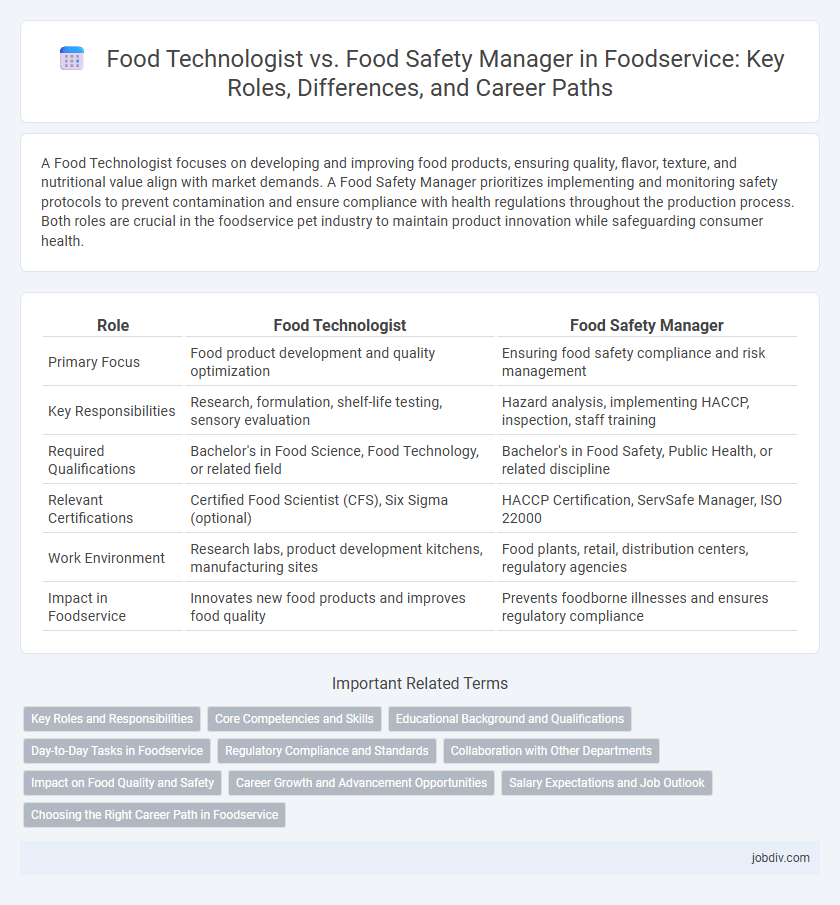A Food Technologist focuses on developing and improving food products, ensuring quality, flavor, texture, and nutritional value align with market demands. A Food Safety Manager prioritizes implementing and monitoring safety protocols to prevent contamination and ensure compliance with health regulations throughout the production process. Both roles are crucial in the foodservice pet industry to maintain product innovation while safeguarding consumer health.
Table of Comparison
| Role | Food Technologist | Food Safety Manager |
|---|---|---|
| Primary Focus | Food product development and quality optimization | Ensuring food safety compliance and risk management |
| Key Responsibilities | Research, formulation, shelf-life testing, sensory evaluation | Hazard analysis, implementing HACCP, inspection, staff training |
| Required Qualifications | Bachelor's in Food Science, Food Technology, or related field | Bachelor's in Food Safety, Public Health, or related discipline |
| Relevant Certifications | Certified Food Scientist (CFS), Six Sigma (optional) | HACCP Certification, ServSafe Manager, ISO 22000 |
| Work Environment | Research labs, product development kitchens, manufacturing sites | Food plants, retail, distribution centers, regulatory agencies |
| Impact in Foodservice | Innovates new food products and improves food quality | Prevents foodborne illnesses and ensures regulatory compliance |
Key Roles and Responsibilities
Food Technologists specialize in research and development, focusing on product formulation, quality control, and innovation to improve food texture, flavor, and shelf life. Food Safety Managers oversee compliance with food safety regulations, implement hazard analysis and critical control points (HACCP) plans, and manage risk assessment to prevent contamination and ensure consumer safety. Both roles collaborate to ensure the production of safe, high-quality food products while maintaining regulatory standards.
Core Competencies and Skills
Food Technologists possess core competencies in food chemistry, product development, sensory evaluation, and formulation, enabling innovation and quality enhancement in food products. Food Safety Managers specialize in hazard analysis, regulatory compliance, risk assessment, and implementation of HACCP and ISO 22000 standards to ensure food safety and prevent contamination. Both roles require strong analytical skills and knowledge of food science, but Food Safety Managers emphasize monitoring safety protocols, while Food Technologists focus on product optimization and innovation.
Educational Background and Qualifications
Food Technologists typically hold a bachelor's degree in food science, technology, or a related field, with strong knowledge in chemistry, microbiology, and food processing techniques. Food Safety Managers often possess certifications such as HACCP (Hazard Analysis Critical Control Point) and may have degrees in food safety, public health, or quality assurance, highlighting their expertise in regulatory compliance and risk management. Both roles require specialized training, but Food Safety Managers focus more on implementing safety standards, while Food Technologists emphasize product development and innovation.
Day-to-Day Tasks in Foodservice
Food Technologists in foodservice primarily focus on product development, quality control, and ingredient functionality, ensuring the creation of safe, flavorful, and consistent menu items. Food Safety Managers oversee daily sanitation protocols, compliance with food safety regulations such as HACCP and FDA standards, and staff training on hygiene practices to prevent foodborne illnesses. Both roles collaborate closely to maintain product integrity and customer safety, with Food Technologists driving innovation and Food Safety Managers enforcing strict safety procedures.
Regulatory Compliance and Standards
Food Technologists develop and improve food products while ensuring compliance with regulatory standards such as FDA, USDA, and EFSA guidelines to meet safety and quality requirements. Food Safety Managers oversee the implementation of HACCP, GMP, and ISO 22000 certifications to maintain food safety protocols and regulatory adherence across production facilities. Both roles require expertise in local and international food laws, but Food Safety Managers primarily focus on risk assessment and compliance management to prevent contamination and protect public health.
Collaboration with Other Departments
Food Technologists collaborate closely with research and development teams to innovate product formulations, while Food Safety Managers coordinate with quality assurance and regulatory departments to enforce compliance standards. Both roles require seamless communication with procurement and production units to ensure ingredient safety and process integrity throughout the supply chain. Their joint efforts enhance overall food quality, minimize risk, and support consumer health standards within the foodservice industry.
Impact on Food Quality and Safety
Food Technologists apply scientific principles to develop and enhance food products, ensuring optimal taste, texture, and nutritional value, directly influencing food quality. Food Safety Managers implement and monitor compliance with food safety regulations and standards, reducing contamination risks and safeguarding consumer health. Both roles are critical in maintaining high standards, with technologists focusing on product innovation and managers on hazard control and regulatory adherence.
Career Growth and Advancement Opportunities
Food Technologists often experience career growth by developing innovative products and improving food processing techniques, leading to roles such as R&D Manager or Product Development Director. Food Safety Managers advance by ensuring compliance with health regulations, which can elevate them to positions like Quality Assurance Director or Regulatory Affairs Specialist. Both careers offer strong advancement opportunities, but Food Safety Managers typically progress through leadership roles in risk management, while Food Technologists move towards innovation and product portfolio expansion.
Salary Expectations and Job Outlook
Food Technologists typically earn between $50,000 and $75,000 annually, with growth driven by innovation in food product development and processing technologies. Food Safety Managers command salaries ranging from $60,000 to $90,000, reflecting their critical role in regulatory compliance and risk management within foodservice organizations. Job outlook for both roles is positive, with Food Safety Managers experiencing higher demand due to increasing food safety regulations and consumer awareness.
Choosing the Right Career Path in Foodservice
Selecting a career in foodservice involves understanding the distinct roles of a Food Technologist and a Food Safety Manager. Food Technologists focus on product development, improving food quality, and innovating recipes, leveraging expertise in food chemistry and sensory analysis. Food Safety Managers prioritize regulatory compliance, hazard analysis, and implementing safety protocols to ensure consumer protection and public health.
Food Technologist vs Food Safety Manager Infographic

 jobdiv.com
jobdiv.com